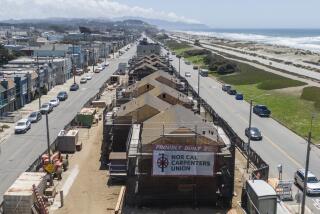Economic recovery will be rapid, San Francisco Fed researchers say
- Share via
Defying some analysts’ predictions of a slow and subpar U.S. recovery, researchers at the Federal Reserve Bank of San Francisco are predicting a rapid economic rebound.
Citing growth in both consumer and business spending, economists Justin Weidner and John C. Williams said recovery “is likely to be faster than from the two previous recessions” in a report released Monday.
Recent wild swings on Wall Street, tepid April retail sales figures and fears of global contagion from the Greek debt crisis have some worried that the improving U.S. economy could easily reverse course.
But that hasn’t tempered the optimism of the researchers at the San Francisco Fed.
“I see no signs of a double dip,” said Williams, director of research at the San Francisco Fed. “The economy continues to gain momentum, and consumer spending and business investment continue to improve.”
Economists have been debating for months over the likely strength of the U.S. recovery.
Though a double-dip recession is still the minority view, a good number of analysts have predicted a sluggish “U-shaped” recovery with annual growth in gross domestic product of about 3% coming out of the trough. That’s a contrast to the “V-shaped” recoveries that occurred from the late 1950s into the 1980s, during which GDP growth averaged about 5.5% over the first two years after the recession ended.
The U-shaped camp contends that debt-strapped consumers in a weak labor market won’t be opening their wallets in the near term. But Williams said low interest rates and pent-up demand by businesses are set to drive robust growth, while consumers are being helped by tax cuts and other stimulus spending.
In the first quarter of 2010, investments in equipment and software grew more than 10% over the same period last year, Williams said. Surveys of purchasing managers also indicate that spending is up, he said. Consumers are starting to buy new cars, clothes and homes again too, he said. In March, for instance, U.S. retail sales posted their biggest gain in four months.
“It’s kind of a natural part of the process — you cut back for a couple of years, and then you need to replace things eventually,” Williams said.
Other economists disagree. They point to April retail sales as a sign that the March bounce may not be sustainable; nearly 70% of chains missed expectations last month. They worry that the volatile stock market will affect spending by the wealthy, who are leading the consumer comeback.
“You still have a very constrained balance sheet on the part of consumers,” said David Shulman, senior economist at the UCLA Anderson Forecast.
Not even business spending is guaranteed to recover at a strong pace, said Christopher Thornberg, founding principal of Beacon Economics.
His forecast this month called for slow growth this year and next, warning that many banks are still stuck with delinquent loans and that the sovereign debt crisis could affect borrowing.
“The financial market is still volatile, the banks are still a mess, the commercial real estate market is still a mess,” he said. “They’re being ridiculously optimistic.”
More to Read
Inside the business of entertainment
The Wide Shot brings you news, analysis and insights on everything from streaming wars to production — and what it all means for the future.
You may occasionally receive promotional content from the Los Angeles Times.











